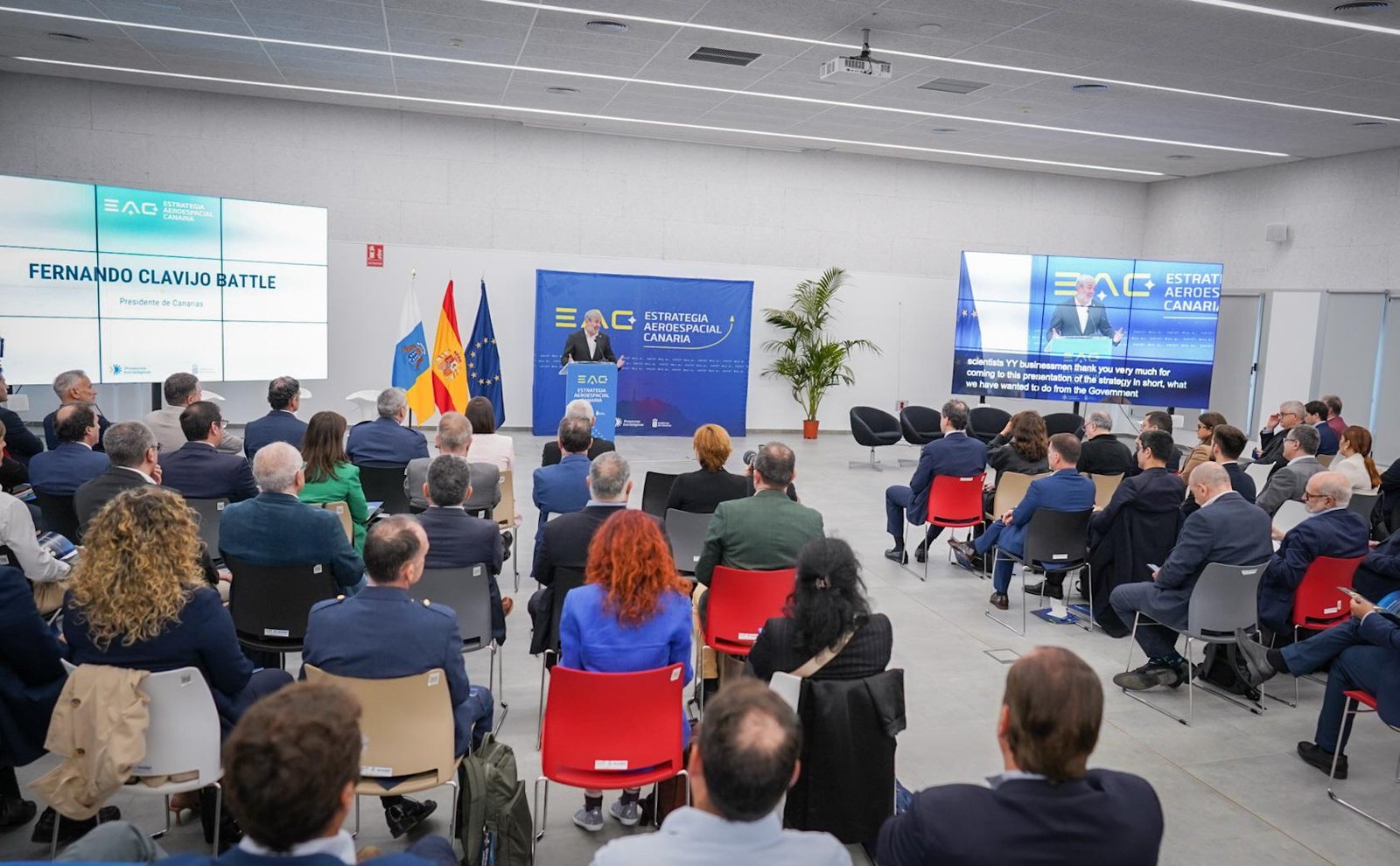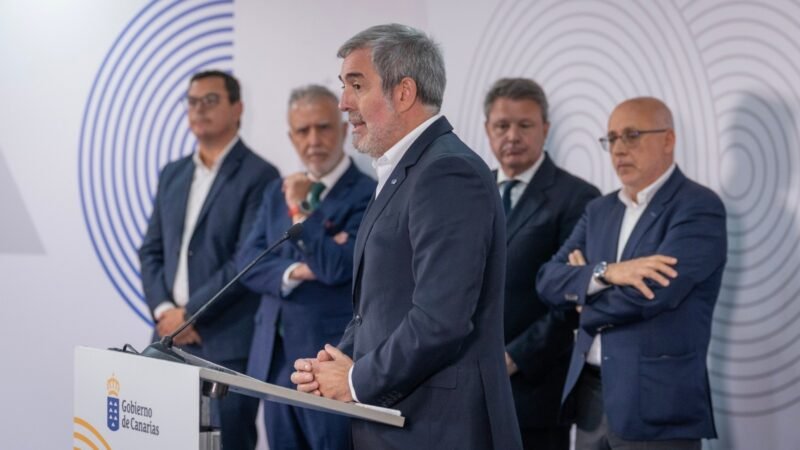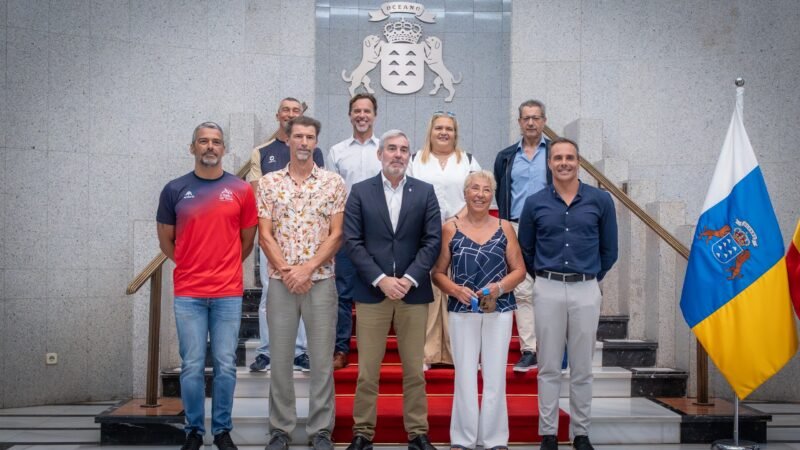Portal de Noticias del Gobierno de Canarias – Estrategia Aeroespacial Canaria

President Clavijo highlights the importance of coordinating all public-private efforts with the aim of promoting a rapidly expanding industry that contributes wealth and quality employment.
The archipelago aims to leverage its geographical location, the prestige of its scientific facilities, and the talent provided by public universities to become an international benchmark.
The President of the Canary Islands, Fernando Clavijo, presented on Wednesday the strategy designed by the Government to position the archipelago as a «key player» in the Spanish, European, and global aerospace sector. The goal of this new Canarian Aerospace Strategy (EAC) is to coordinate public-private initiatives under one umbrella to attract companies to the islands that contribute wealth, diversify the productive fabric, and create quality employment by «working together.»
In this regard, Clavijo highlighted the opportunity for the Canary Islands to become a hub for the aerospace sector in the middle of the Atlantic, and the importance of investing in an expanding industry based on innovation and technology. «We cannot let this opportunity pass us by,» he said, explaining that the EAC is born with the goal of facilitating the implementation path for companies on the islands and facilitating their access to public funds that support the development of cutting-edge projects.
The head of the regional government expressed confidence that the Canary Islands have «everything necessary» to become «a key player in a high-value-added industry such as aerospace,» a sector that represents a «great opportunity» to diversify the Canary Islands’ economy.
During the presentation of the Canarian Aerospace Strategy at the IACTEC Building of the Technology Park of Las Mantecas (La Laguna), he recalled that the archipelago has «a combination of almost unique advantages» for attracting companies looking around the world at this moment to develop their projects focused on innovation and the development of new technologies.
In addition to the climatic conditions, topography, being surrounded by the sea, proximity to Africa, and the economic-fiscal benefits, Fernando Clavijo assured that the islands have a solid foundation on which to build a competitive aerospace industry. «We have a robust ecosystem of scientific and technological infrastructures,» he said, referring to the international prestige of facilities such as the Canary Islands Space Center (CEC), the Institute of Astrophysics of the Canary Islands (IAC), the Grantecan, the Plocan, and the Canarias Stratoport for HAPS & UAS in Fuerteventura.
The President of the regional government also took advantage of the presentation of the Canarian Aerospace Strategy to refer to the existing talent in the islands as another competitive advantage. «We have teams with extensive experience in sectors complementary to aerospace, professionals from our public universities who will be key to offering our talent to companies that are already investing in the Canary Islands and those that will soon do so,» he stated.
In his opinion, with the Canarian Aerospace Strategy as a guide, all these advantages must be utilized to take «an important step» in the implementation of a sector that will complement and diversify the productive model of the islands with a component based on innovation and knowledge that «fully aligns with our commitment to sustainability.»
The head of the Government also referred to the multiplier effect that the aerospace industry can have on some of the main challenges in the Canary Islands and many other territories. Prevention and management of forest fires; control of migratory flows; improvement in urban planning; management of water emergencies; precision agriculture; land and maritime security; or monitoring climate change are some of its many possible applications.
Projects and funds
The Director General of Organic Coordination and Strategic Projects, David Pérez Dionis, was in charge of presenting the main characteristics of the Canarian Aerospace Strategy accompanied by the representative of the consulting firm responsible for preparing this document, Manuel Varela. In addition, the presentation of the EAC was attended by the Minister of Universities, Science, Innovation, and Culture, Migdalia Machín, the Innovation Councilor of the Tenerife Island Council, Juan José Martínez, and the Director of the Institute of Astrophysics of the Canary Islands (IAC), Valentín Martínez Pillet.
Dionis emphasized the importance of the Canary Islands becoming a key player in the national, European, and international aerospace industry. In Spain, according to the latest report from the Spanish Association of Technological Companies for Defense, Security, Aeronautics, and Space (TEDAE) on the economic and social impact of this industry, the sector generated a turnover of 13.9 billion euros in 2023, with an impact of almost 19.7 billion euros, approximately 1.3% of the national GDP. Furthermore, it provides around 215,600 direct and indirect jobs.
«We are convinced that it is time to take a quantitative and qualitative leap to diversify our economy by taking advantage of the opportunity offered by the aerospace sector,» highlighted the Director General, ensuring that the Government of the Canary Islands will contribute to facilitating access to state and European funds aimed at the aerospace sector. «We will also offer financing lines that promote the development of the aerospace industry in the islands and allow the implementation of specific initiatives, such as specialized training and qualification programs or support for projects promoted by Canarian startups,» he stated.
On his part, the Director of the Institute of Astrophysics of the Canary Islands (IAC), Valentín Martínez Pillet, thanked the Government of the Canary Islands for driving this initiative, «in which we have been actively working for a long time and which we see gradually solidifying and yielding significant results.» The IAC provides scientific and technological knowledge in service to society with what is now called «dual use. That is, the technology designed for Astrophysics now serves a variety of sectors ranging from environmental monitoring to health or agriculture,» Martínez Pillet affirmed.
Finally, Valentín Martínez Pillet pledged that the IAC will contribute with its technology to strengthen this sector in the Canary Islands. «We will continue to collaborate with all authorities and public and private agents in the Canary Islands for this purpose,» he stated.
Also, the Innovation Councilor of the Tenerife Island Council guaranteed support for the Canarian Aerospace Strategy promoted by the regional government, a roadmap that, according to Juan José Martínez, will be crucial for the islands to continue being a benchmark in this field of innovation and new technologies.
National and International Allies
The Canarian Aerospace Strategy, coordinated from the Government Presidency through the Directorate General of Organic Coordination and Strategic Projects, includes among its lines of action the creation of an Operational Advisory Committee of the Strategy and an Aerospace Alliance of the Canary Islands in which all sector agents, both public and private, as well as scientific and technological centers and Canarian universities, are represented. The goal is to unite efforts to organize the map of aerospace projects and initiatives, as well as to align priorities and maximize the potential synergies and capacities of the Canary Islands in this sector.
On the other hand, the EAC establishes the need to align with international and national aerospace initiatives and strategies with the aim of positioning the Canary Islands as an international benchmark in the aerospace field. Thus, in addition to coordinating with the programs of the Spanish Space Agency (AEE), with the Aerospace PERTE, or with the Strategic Agendas of the Spanish Aerospace Technological Platform (PAE), the Canarian Aerospace Strategy aspires to establish synergies with equivalent initiatives from other autonomous communities, such as the New Space Strategy of Catalonia, the Aerospace Strategy of Andalusia, or the Civil UAVs initiative of the Xunta de Galicia.
It also includes collaboration with aerospace strategies belonging to regions of other countries and territories with similar challenges. As an example of this, work is already being done jointly with the Space Azores Strategy in organizing the upcoming Symposium of the European network NEREUS, which brings together European regions using aerospace technologies, to be held in the Portuguese islands next October.
This search for national and international allies – the presentation day of the Aerospace Strategy included the participation of the director of the Spanish Space Agency, Juan Carlos Cortés, with a video applauding the regional government’s initiative. Subsequently, several discussion panels were held. The first focused on Space, another on Insular Aerospace Initiatives, and a third panel of discussion on the necessary public-private collaboration to advance the archipelago’s commitment to the aerospace industry.






